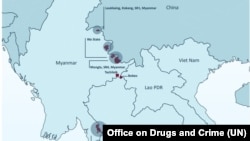Organized crime gangs behind Asia’s so-called "scamdemic" have set up remote bases in Myanmar’s border area with China — locations that are hard for police to reach and where the trafficking victims they use to perpetrate online scams have little hope of escape, a U.N. report said Tuesday.
Billions of dollars have been scammed by powerful Chinese and Taiwanese crime groups based in the Mekong region — as well as in the Philippines — who bombard the internet with romance scams, extortion and investment pyramid schemes.
While some crackdowns have taken place in Cambodia and the Philippines, the crime groups are refining their scams from fortified compounds under the protection of ethnic rebels in conflict-torn Myanmar, the United Nations Office on Drugs and Crime said in its report.
In Myanmar, a major crime base has mushroomed around the Myawaddy region, which is separated by a small river from the western Thai border town of Mae Sot.
A second cluster of compounds run along Myanmar’s eastern frontier with China, heading north through Shan State, through the special administered area of Wa State and up to Kokang, which borders China’s Yunnan province.
Ethnic militias in the area have an extensive history of trafficking drugs, rare wildlife and people far from the reach of Myanmar’s military government which is battling a widespread rebellion by pro-democracy activists.
Myanmar is “uniquely home to non-state armed groups that control important border areas and have a history of working with organized crime syndicates,” the UNODC report said.
“These non-state armed groups operate numerous casinos in autonomous Special Regions and territories, and in border towns such as Tachileik adjacent to Thailand,” the report said, estimating at least 20 casinos are in operation, although it is impossible to verify the real number.
All the scam hubs combined are believed by international observers to have sucked in tens of thousands of people from Asia and beyond to run their cyber cons.
Many of them are young, educated people who have traveled to Myanmar’s scam compounds believing they have been legitimately recruited for high-paying jobs in tech or internet sales. Once they realize their situation most have to pay ransoms to leave. The ransoms are sometimes paid by families, sometimes by embassies or NGOs.
Others, the UNODC said, know they are going to scam before they leave their own countries, sometimes convincing friends and family to join them for a fee from the scam compound directors.
The Myanmar government could not be reached for comment. However, China and some southeast Asian countries have agreed to work together to tackle the scam crisis.
The scams emerged in casinos founded in Cambodia to serve China’s thirst for online gaming and so-called junket gambling tours.
With borders closed during the pandemic, the junkets ceased, and the casinos were refitted into scam parks, hastening plans that had long been “in the works,” the study said.
“Organized crime groups are converging in the region where they see vulnerabilities,” Jeremy Douglas, a UNODC regional representative who contributed to the report said.
Law enforcement “operations against syndicates in some countries like the Philippines have caused a partial displacement, and we have seen criminals moving infrastructure into places where they see opportunity — basically where they expect they will be able to take advantage and not be held to account, to remote and border areas of the Mekong,” Douglas said.
In Myanmar, most compounds are in or near special economic zones, the report said, which mix tourism and tax breaks for investors with “large purpose-built structures … with the sole objective of providing the infrastructure for large-scale online scam and fraud operations.”
The compounds are “fortified to ensure that victims cannot escape,” with metal bars on windows and balconies of offices and dormitories, and “armed guards with pistols, electric whips and handcuffs are positioned at the compound entrance,” the report added.
Some scam workers are paid, others not, it varies from location to location and frequently depends on the victim’s success in generating income for the scammers. But few are allowed to take money out of the scam compounds – they must spend the money they receive inside.
Essentially the system relies on a lot of trafficked free labor who then must pay extra to leave. The crime groups are making money in every way possible.
Evidence of abuse and torture has mounted from people who have fled the scam compounds.
Camera phone videos from an apparent scam compound in Kokang filmed over recent months seen by VOA show scores of Thais with their hands tied being marched around an exercise zone by armed guards as a punishment for not meeting "sales" targets.
“Once you’re inside, you are cut off. It becomes the only world that you know. You wake up, work … repeat,” a Thai woman in her late 20s who was trafficked into a scam compound in Shan State told VOA.
The woman, who requested anonymity, said she was freed after three months when a ransom was paid by an individual who did not wish to be identified.
The majority of people in Myanmar’s scam centers have crossed the border from Thailand, which is “an origin and transit country” for trafficking people into forced criminality, the report added.
Nongovernmental organizations and embassies contacted by families or even the victims themselves via social media are able to negotiate some releases from the Myawaddy compounds by paying a ransom fee of between $3,000 to $6,000.
But the UNODC said the more remote compounds in Shan State left victims a long way from help and hope.




